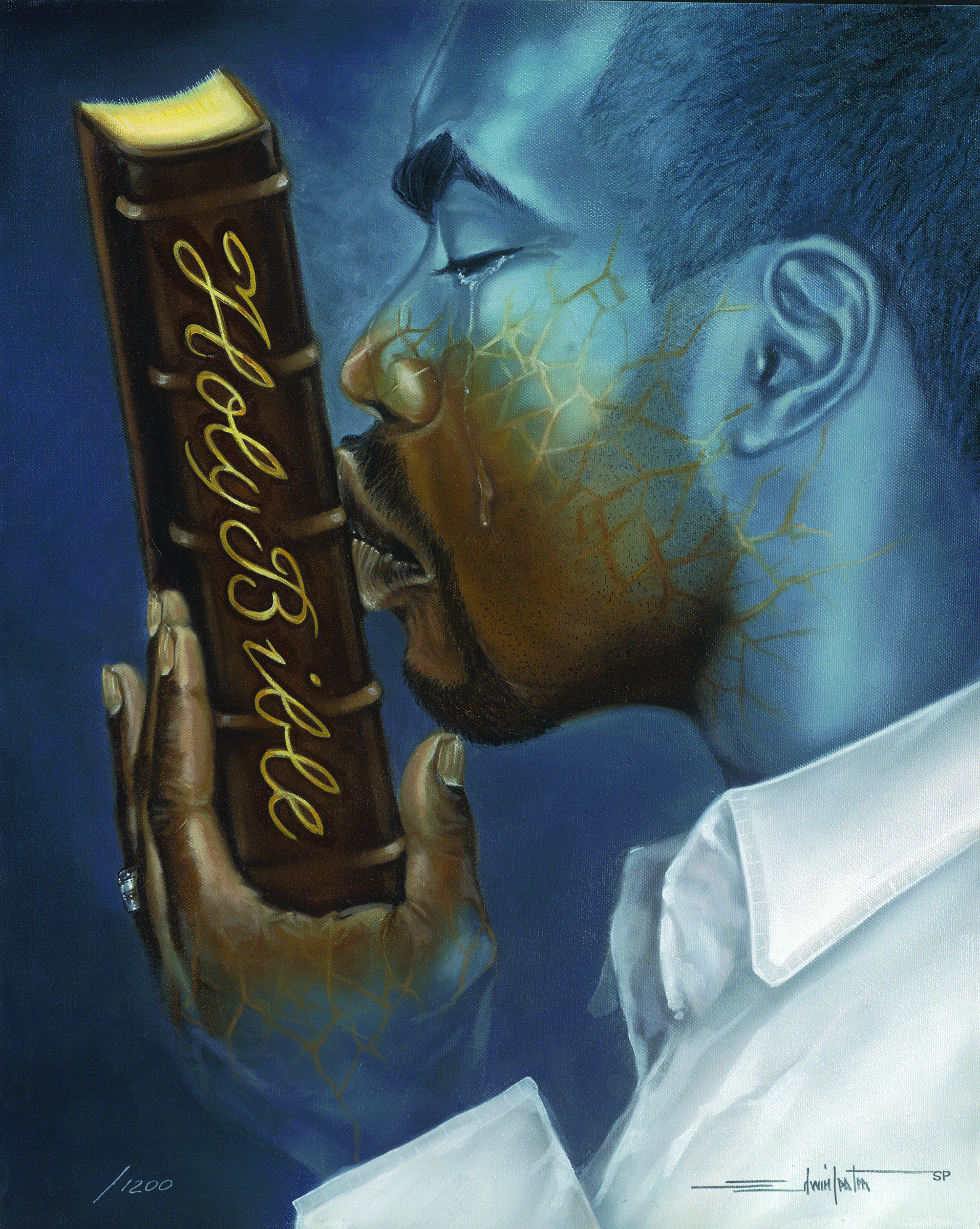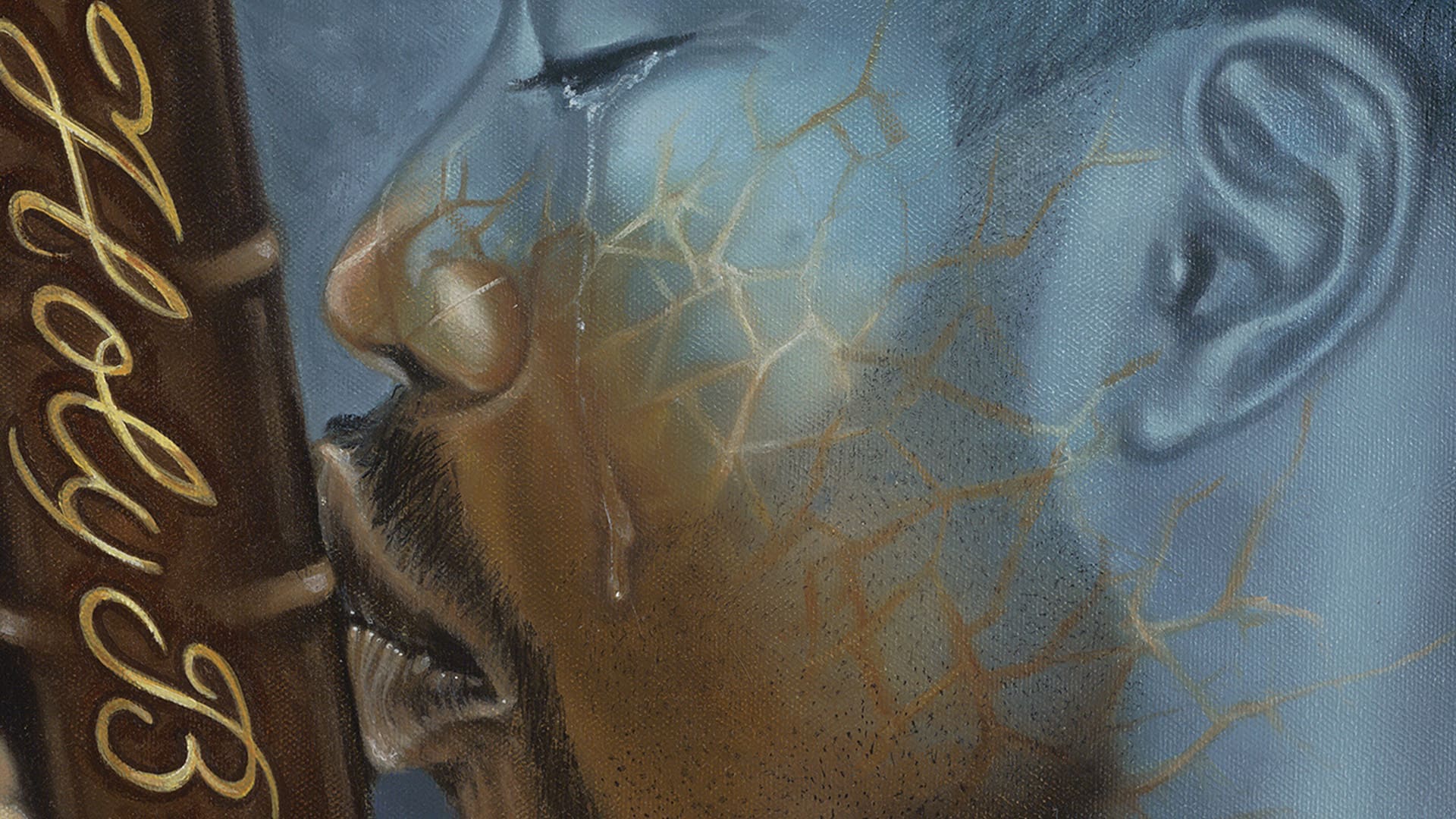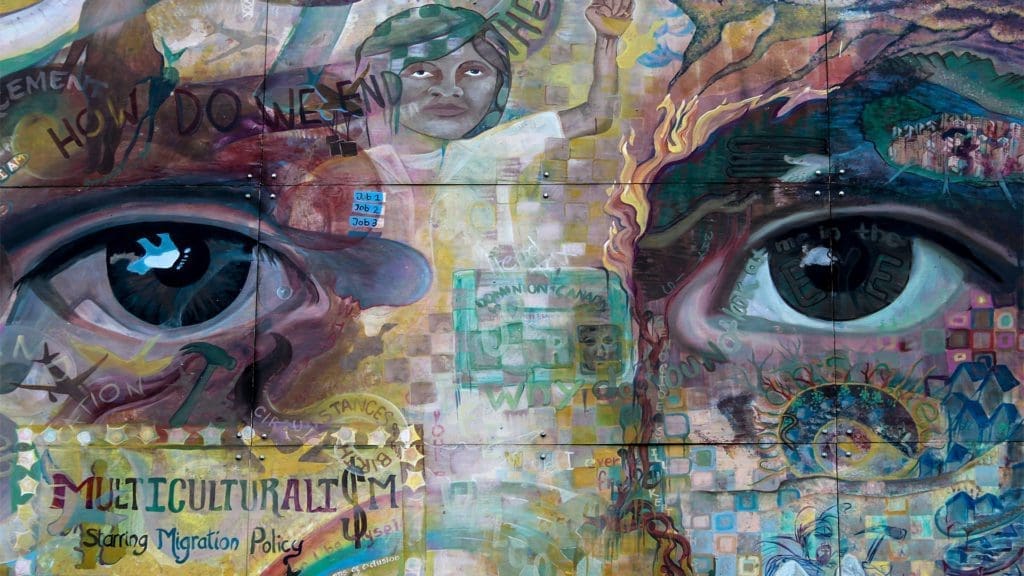T
The following essay has been adapted from a speech that AND Campaign president Justin Giboney delivered at Heirs of Action, an event hosted earlier this year by Black Church elders to bless and establish the AND Campaign as a credible representative of their sociopolitical perspective, an institutional descendant of the American civil rights movement. It is to be read as oratory.
—The editors
. . . A silversmith named Demetrius, who made silver shrines of Artemis, brought in a lot of business for the craftsmen there. He called them together, along with the workers in related trades, and said: “You know, my friends, that we receive a good income from this business. And you see and hear how this fellow Paul has convinced and led astray large numbers of people here in Ephesus and in practically the whole province of Asia. He says that gods made by human hands are no gods at all. There is danger not only that our trade will lose its good name, but also that the temple of the great goddess Artemis will be discredited; and the goddess herself, who is worshiped throughout the province of Asia and the world, will be robbed of her divine majesty.”
When they heard this, they were furious and began shouting: “Great is Artemis of the Ephesians!” Soon the whole city was in an uproar. The people seized Gaius and Aristarchus, Paul’s traveling companions from Macedonia, and all of them rushed into the theater together. Paul wanted to appear before the crowd, but the disciples would not let him. Even some of the officials of the province, friends of Paul, sent him a message begging him not to venture into the theater.
The assembly was in confusion: Some were shouting one thing, some another. Most of the people did not even know why they were there.
—Acts 19:8–10, 24–32
If Not a Miracle
America’s Reconstruction era was the short period after Emancipation and the Civil War when the country was trying to bring stubborn Confederate states back into the Union. Booker T. Washington called it a time of “storms and stress.” Let’s just say it didn’t end well. But for a time . . .
Black men were able to vote and hold elected office. So Washington also noted that it gave rise to “brilliant political leaders in the newly enfranchised race,” black leaders whose oratory and political prowess were outstanding if not miraculous given the circumstances. Yesterday some of them had been property under the law. Now they were fashioning the law: one foot in congressional chambers and one still on the plantation. I’m talking about fieldhands with policy pens in their palm. From the auction block to the podiums of some of the most consequential deliberative bodies in the world . . . head unbowed, faith unshaken.
At the height of Reconstruction, around two thousand African Americans held elected office, many of them Christian preachers like Hiram Revels and Henry McNeal Turner. They would master parliamentary procedure and become virtuosos of statecraft. The New York Times noted that they were often the best debaters in the legislature. Blessed with common sense and rhetorical flourish, one journalist said the “African love of melody was noticeable in the harmony of [their] delivery.” In other words, their rhetorical techniques were soulful. It’s as if they’d taken the sacred desk and a Hammond organ, placed it in parliament, and made it their own.
Even in the civic assembly they were in the Spirit because the black ecclesial tradition has always had a habit of bringing the church with them into the public square. Not in violation of the separation between church and state, but as a testament of the Lord’s sovereignty in the sanctuary and in what would otherwise be secular jurisdiction.
Prior to this, the man who’s been called the author and designer of America, Thomas Jefferson, had said that blacks were “inferior . . . in the endowments both of body and mind.” But of course, he had not read the prose of Zora Neale Hurston. He had not heard Thomas Dorsey compose and tickle the ivory. He had not engaged in call and response to the homiletics of Gardner C. Taylor. In this regard, he himself was enslaved by his ignorance, but he should’ve known better.
This lie has haunted the American psyche from its founding, corroding its institutions and forming an asymmetrical judicial body. Our brilliant Constitution and civic mechanism were compromised by this vicious deceit, an error of massive proportions that even pervaded the church. Our laws and our pews were discolored by a race-based proposition with no theological or scientific basis. It served the schemes of men but defied the will of God.
But on January 6, 1874, Congressman Robert B. Elliott would exemplify the dexterity of these black legislators as he argued on behalf of the Civil Rights Act. On that day, he was responding to Congressman Alexander Stephens, former vice president of the Confederacy and future governor of Georgia, known as the brains of the Confederacy. In this exchange, Elliott would dissect the brain and the heart of the Confederacy. With boldness and persuasion, he’d expose the contradictions and malice at the core of their cause. In a composed yet tenacious manner, he’d offer a compelling constitutional and moral case for the furtherance of civil rights. The consensus of those in attendance was that he annihilated his opponent, skillfully disemboweling the South’s leading apologist, undressing his pride and his prejudice.
When the unconquerable light shines on the distortions of the Prince of Darkness, false gods are robbed of their divine majesty, the emperor’s nakedness is recognized, and the ugly shadows hiding his children’s dignity dissipate.
Elliott would also respond to a Virginia Congressman who’d earlier said his remarks were addressed to the white men alone, everyone else being beneath his consideration. To this Elliott said, “I shall have no word of reply. Let him feel that a negro was not only too magnanimous to smite him in his weakness but was even charitable enough to grant him the mercy of his silence.”
This historical moment might’ve surprised some, but what I know is my God is often very conspicuous when he exposes the devil as a liar. When the unconquerable light shines on the distortions of the Prince of Darkness, false gods are robbed of their divine majesty, the emperor’s nakedness is recognized, and the ugly shadows hiding his children’s dignity dissipate. When God submits the truth into evidence, “the light shines in the darkness and the darkness has not overcome it.”
As Elliott was piercing through logical fallacies, I believe God was using every word and turn of phrase to expose white supremacy as an affront to his design and eschatological plan. Let’s not underestimate what it took to look the perpetrators of your people’s genocide in the eye and tell the whole truth without sinning under the weight of his anger. Elliott had backbone—he was bold and upstanding. He had mouthpiece—he was a studied and persuasive advocate. He had good news—redemption, justice, righteousness.
Exposition—Paul Is Bold and Persuasive
Elliott’s speeches were full of biblical allusions and gospel sensibilities, and we see a similar brand of proclamation in the Bible.
In Acts 19, Dr. Luke gives us an epic-style look into how Paul maneuvered through treacherous territory. Here, Paul’s ministry interacts with a number of arenas in society. He preaches in the synagogue to contrary congregants who weren’t moved by learning or burning. Oddly, he has more success when he enters institutions of higher learning and the gospel spreads across Asia through his dialogue in the lecture hall of Tyrannus. In the marketplace, Paul’s commentary on the insignificance of graven images disrupts the supply and demand of business economics. We then see unions, protests, cancel culture, riots, and political fallout.
What are we to make of this? For one, Paul’s witness was not disconnected from other spheres of life. Preaching the gospel was not at odds with engaging the public square. We see Paul engaging other systems of belief with biblical integrity and the ultimate objective of spreading the gospel. This is the Great Commission in action—an extension of Jesus’s work.
Jesus came to seek and save the lost, and that wasn’t detached from how he deliberately uplifted the marginalized. In the Old Testament prophets, we see that prophetic words were sometimes indistinguishable from social action. It’s an ongoing theme.

But social action doesn’t save us. Our faith certainly isn’t less than a call to action. Christianity is not lacking in the ethic and the imperative to do justice and set the oppressed free. In the same breath, social justice isn’t a substitute for salvation and personal transformation. Our social action must submit to God’s truth and design. Even in our politics, we shouldn’t merely be concerned with material things. For instance, we’re compelled to advocate for child nutrition programs while understanding they shall not live on bread alone. Our schools shouldn’t become temples where moral foundations are undermined as a matter of course. But for many of us, our advocacy ends at the ballot box or stays within the ideological lines drawn by others. We’ve allowed parties to become the masters of our social action.
Understand: We’re called to something far greater than partisanship, something much more profound. If our public witness votes and lobbies but doesn’t testify, if it debates and protests but doesn’t forgive, if it bargains and barters but doesn’t administer justice, if it threatens and punishes but doesn’t restore, then we politick in vain. If people can’t see the gospel in our policy prescriptions, then we’re discipling backwards.
Acts 19 shows us that in the church, in the academy, in business, and in the civic arena, the gospel has something to say and must be accounted for. But it’s not just what Paul did in those spaces, it’s how he did it. Verse 8 talks about him speaking boldly and persuasively. He had backbone, mouthpiece, and good news.
The Culture War—Christian Nationalism Versus Secular Progressivism
In Acts 17, Paul goes into the agora, the marketplace of ideas, where the baddest philosophers and debaters went to match wits and exchange ideas. It wasn’t for the ill-prepared or faint of heart. They didn’t suffer fools lightly, because the ideas that came out of the agora would spread across the entire Roman Empire.
Paul was up for the challenge. The Bible says he reasoned with them as was his custom. He had studied the culture and used their rhetorical devices to make a logical case for the gospel. Paul even used the Socratic method. This debunks the idea that Christianity calls us to be anti-intellectual. Our Savior is the Logos. Our faith isn’t at odds with logic, it just recognizes the limits of human logic.
In the same breath, we should learn from and wrestle with the great thinkers: philosophers, economists, political scientists, literary giants. When you’ve done your homework and you have backbone, mouthpiece, and good news, you don’t have to run from a little intellectual pugilism. When the merits of the case are on your side, you don’t have to cancel and censor your opponents. Like Robert Elliott, you can walk in the arena prepared for all the smoke.
But I’d like to contrast the Acts 17 scene with the chaos in Acts 19. The Bible says, “The assembly was in confusion: Some were shouting one thing, some another. Most of the people did not even know why they were there.” While Paul’s purpose and objectives were clear, here we see rage without a fully articulated cause or solution. No direction, no thirst for knowledge; just thirst for blood.
They didn’t know why they were there. Paul, on the other hand, knew exactly why God called him there. He was on mission, and he understood the assignment. He wasn’t wandering through the public square like a lost puppy panting for the approval of his secular peers.
I’d submit that the culture war has brought the American discourse into a similar brain-dead state. Unfortunately, many Christians haven’t reacted with gospel-centered dignity, righteous advocacy, and love.
What is the culture war exactly? It’s a social and political battle between conservatives and progressives for the heart and soul of America, each side vying for control of America’s values and norms.
James Davison Hunter, who popularized the term “culture war,” notes that “the cultural conflict in America is primarily between sectors of white America.” A study called “The Hidden Tribes of America” later confirmed the same. It showed that America’s discourse is controlled by two groups—Progressive Activists (8 percent) and Devoted Conservatives (6 percent). They vehemently disagree about almost everything but have two important things in common: they’re overwhelmingly white and affluent. They frame the issues, set the terms of engagement, and manufacture consent because they control the reward and punishment mechanisms in culture and politics. They have an outsize influence in media, higher education, and political campaigns. This presents a dilemma for people in our community who have to either join their chorus or render themselves invisible.
These two groups are so polarized that they’ve created a false choice in society, one where we must either support social justice or moral order, love or truth, compassion or conviction. We’re forced to go all the way to the right at the expense of Christian compassion or go all the way to the left at the expense of Christian convictions. We’re told these are the only two legitimate ways to engage society. And we believe it.
Well, I come to tell you tonight that this is an affront to the very essence of the Black Church’s historic witness, and more importantly an affront to the gospel. While conservatism can make truth harsh and progressivism can make love overly sentimental and self-indulgent, the Bible tells Christians to speak the truth in love.
The gospel gives us both love and truth at their peak. The gospel merges love and truth—it shows us they’re not in conflict, but interdependent. The gospel demands both liberation and holiness. It compels us to challenge both conservatism and progressivism because neither is an exposition of the gospel.
Dumbing the Christian public witness down to ideological conservatism or progressivism is like reducing Florence Price’s Symphony No. 1 in E Minor to a fast-food commercial jingle.
The Black Church’s public witness is unique and dignified. Not the grinning, parroting, groveling, shucking, equivocating, simping, prostituted servant of culture-war progressivism. Dumbing the Christian public witness down to ideological conservatism or progressivism is like reducing Florence Price’s Symphony No. 1 in E Minor to a fast-food commercial jingle. It’s cheap and tragic.
We’ve allowed our political affiliation to become religious in nature. We’ve let those who don’t even know the gospel frame the issues, speak on our behalf, co-opt our legacy, and indoctrinate our best and brightest. I come to tell you today that these ideological gods made with human hands are no gods at all. Despite claims of divine majesty, they have no real cross, no empty tomb, nor any risen Savior to offer you.
Conservatives: Arrogance and Lovelessness
Conservatism, at its best, attempts to conserve or preserve values and institutions that help society flourish. In theory, Christians shouldn’t have a problem with that proposition. We shouldn’t be against structure or deny absolute truth.
The problem is, we live in a broken world. Therefore, some institutions, systems, and traditions must change. Furthermore, some systems, by design, are exploitative, racist, and sexist and must be dismantled. To preserve them is to oppress.
Too often the custodians of conservatism have employed wicked systems and oppressive traditions to serve their own interests and maintain power. Like Alexander Stephens, they’ve called lies truth to demean and control their neighbors. That is unequivocally un-Christlike; it accords with Dr. King’s definition of racism. He said, “Racism is the false and tragic notion that one particular race is responsible for all the progress, all the insights and the flow of history.” Isn’t that the message and spirit of Christian nationalism? It says, “Look at the nation my people created! You should be thankful, follow our lead, and shut up.” It then falsifies and idolizes American history to serve that narrative. Erasing its debts, it’s arrogant. But it’s an arrogance that lacks self-awareness. Like a man parading around with an air of superiority while his fly is open and his toupee is off-center, unbeknownst to him, his fraud has been exposed and gone viral.
Well, the jig is up. No one believes the good ol’ boys are the all-knowing good Samaritans of the world. Yet Christian nationalism has the audacity to imply that this bastardization of the faith shouldn’t have to do the work of democracy and persuade their neighbors. They imply that their authority should be assumed.
I beg their pardon, but this ideological tradition got slavery wrong and opposed the civil rights movement. Under no circumstances should their judgment go unchecked. They say progressives are the embodiment of evil, but some progressives sacrificed their lives during the civil rights movement, while conservative Christians misused the Bible to defend injustice. And the laws of the secular world had to force many conservative Christians to treat their brothers and sisters with human dignity. There’s plenty to be humble about.
People don’t care how much theology you know if that theology doesn’t lead you to love and sacrifice for others.
J. Gresham Machen once said that the difference between orthodoxy and liberalism was that orthodoxy was willing to go to the cross with a broken heart about sin. So many conservative Christians refuse to address racism and injustice with broken-hearted humility and repentance. Proud and loveless, they’ve become a liability to their own moral causes. People are leaving the church, associating it with hard-hearted evangelicals. They’ve become the perfect foils for those determined to tear down the church.
People don’t care how much theology you know if that theology doesn’t lead you to love and sacrifice for others. If it doesn’t lead you to repair systems that benefit you but hurt your neighbors, then it’s not reflecting the gospel.
We see the arrogance, the condemnation, the thirst for power, but where’s the good news?
Progressives: Sentiment and Self-Indulgence
Progressivism, at its best, seeks to fix broken systems and institutions, to move forward past old errors, to free humanity from abuses of power and oppressive tradition. In theory, Christians shouldn’t have a problem with that. A broken world will have broken systems that need fixing.
The problem is, when timeless, universal truths conflict with human desires and perspectives, progressivism assumes it’s the truth that’s broken and must be deconstructed, not the sin in us. It attacks anything that gets in the way of individual autonomy, including God-ordained institutions. It’s self-indulgent—so the only good news is that which affirms our feelings.
Some of our friends on the left would have us believe that conservatism is the sole perpetrator of all that is wrong with society. But let us not be so gullible or simple-minded to fall for that. The hypocrisy and legalism of the Pharisees did not blind Jesus to the hypocrisy and unbelief of the Sadducees. One side being wrong doesn’t make the other side right. Jesus didn’t become a Herodian because the Pharisees were mean and judgmental. It’s less about choosing a side and more about promoting what’s right. Because when both sides are wrong, even to different extents, Christians must lead, not follow one confused mob or the other.
Racism is real and wicked, but it’s not the only sin, and we risk idolatry if we treat it as such. It’s not conservatives sexualizing children in pop culture. It’s not conservatives normalizing prostitution and advocating for kids to get abortions and change genders without parental consent.
In the masquerade that is American politics, donor-class progressives have learned to wear the face of the marginalized to advance a truth-deficient agenda. Cunningly, they’ve used the bigotry on the right and a distorted concept of compassion to convince us to ignore biology and physiology, to put our convenience over and above the sanctity of life.
Sociologists have used the acronym WEIRD to describe this value system: Western, Educated, Industrialized, Rich, Democratic. It’s based on an ethic of autonomy, not an ethic of community. It centers individual preference, not God, and it’s oblivious to our sin nature.
Dr. Gardner C. Taylor called this out. Many elites believe sin to be an “old, threadbare, and outworn notion.” He conceded the concept of sin was old, but the consequences of sin remain.
The idea might fall on the deaf ears of modernity, but the consequences of sin live on, even if we’re too highbrow or evolved to realize it. Academics have found an alibi for every sin of self-indulgence, but I don’t care how intellectual and intersectional your doctoral thesis is, sin still leads to suffering and death. Pleasure-seeking adults still lead to broken homes, communities, and children. Excess still leads to addiction and disease. Sin by any other name still has the same old results. We can become masters in euphemism, but our new terms and descriptions don’t change the age-old outcomes of sin. And progressivism can’t reconcile that truth.
Regrettably, the most well-educated in our community are susceptible to these WEIRD values that are completely disconnected from the principles that sustained black Christians throughout history. A large part of our professional and leadership class have been uprooted and indoctrinated. We go into institutions of higher learning, the marketplace, and politics, and deny the gospel out of self-ambition. Some of us have even come to believe that being intelligent means being secular and progressive because that’s how little we recognize the brilliance of our own tradition.
Others know better, but as Dungeon Family poet Big Rube once said, we’ve become “cowardly lions never defying the jackals of Babel.” We lack backbone. Even in the pulpit, some of us trust German scholarship more than the authority of Scripture.
I can only imagine how that would’ve grieved the African church fathers who preached orthodoxy between two-toned lips decades before the gospel reached northern Europe. They had backbone, mouthpiece, and good news.
There’s an intellectually dishonest effort to entangle WEIRD values with what it means to be black. But we are not the children of Nietzsche, Rousseau, Hegel, and Freud. We can’t exchange self-sacrifice for self-indulgence, resilience for fragility, and gratitude for irreverence. Let us not conflate a performative ignorance with authenticity.
We must articulate the difference between dignity and respectability. Respectability is superficial; dignity is about the value God placed deep inside you. Respectability is proving your worthiness to others. Dignity is a matter of self-worth: it’s about what God says about you, and what you say about you.
We’re to carry ourselves with decency and dignity, not because we’re seeking validation from majority culture, but because we’re innately valuable and serve a God who demands uprightness.
A Time to Lead
It’s time to lead, church. Which mean ideological tribes cannot decide which issues we address and how we address them. Neither party was blameless for the 2008 economic crisis, the greatest injustice of my lifetime. Don’t let Republicans blame the Left for the closing of rural hospitals. Don’t let Democrats blame the Right for the urban housing crisis that’s destabilized our community; they control those cities!
If we’re primarily worried about somebody’s party and identity over the content of character, then we’ll continue to get the same treatment and the same results. Upright leadership encourages people to think critically. It doesn’t demand blind loyalty and unquestioned allegiance. It knows that a healthy people cannot just critique others but must thoroughly and honestly critique themselves. Self-examination expressed in love is not self-hate. Being told everything you do is right isn’t the blessing one might think it is.
Upright leadership encourages people to think critically. It doesn’t demand blind loyalty and unquestioned allegiance.
This country desperately needs Christians who are intellectually honest and impartial. No politician, party, movement, or culture is beyond a fair and constructive critique. Where some leaders cut deals in the shadows and sell their people’s voice, we must be transparent. Our partnerships will be public. We won’t do the bidding of others for profit. We won’t be perfect, but we must be principled.
It’s time to lead, church. Not because we have all the answers or have been completely innocent of self-indulgence or pride—we certainly have not—but because the Black Church tradition, if we mine through its rich legacy, has a word for this particular moment in the American experiment. A word about how to disagree constructively. A word about how to tenaciously fight evil without becoming evil.
This word does not separate justice and morality, nor does it let self-interest bind compassion or truth. It has a concept of social justice that’s redemptive and more practical than performative. A concept of moral order that has more love than condemnation and knows that to be liberated without structure or direction is quite simply to be lost.
It’s a word rooted in moral imagination. Moral imagination is a derivative of faith—an alternative to cynicism and blind optimism. It’s the ability to see not just the horrors of the past, the toxicity of the present, or the gloomy forecasts of the future. Moral imagination is the capacity to see and cling to God’s promises through the fog of injustice and immorality. It’s the commitment to do right in the absence of temporal rewards. It doesn’t ignore reality, but it’s never arrested by the limitations of the moment. It doesn’t absolve the oppressor, but it never lets them dictate the spirit of our response.
For the Black Church, moral imagination has been a matter of survival. And this here republic will not survive without it.
We wonder aloud how we can coexist with people who get things so wrong. People who are so hateful, so confused, or so apathetic. But God’s grace for wretches like us should humble us. And we should remember that our faith compels us to see the image of God in the most hostile manifestations of human brokenness. To love people who are correctly or incorrectly trying to make sense of the human condition.
The only way to see God in someone who antagonizes you is to be determined to see it. You have to want to see it. You have to love and fear God too much not to see it.
The leadership I speak of doesn’t condemn its LGBTQ neighbor by saying “You should be more like me.” No. It picks them up and says, “I’m fallen too. Let us both take our brokenness to the cross and venture to be more like Christ.”
This leadership sees the suicides and drug overdoses in MAGA America and says, “I’m not gonna do to you how you did to me during the crack epidemic. I’m going to love and advocate for you whether you’d do the same for me or not.” Their loss is not our gain. Their suffering is not our communion.
And I can tell you that conservatism and progressivism won’t lead us to these conclusions. The question is: Are we Christian enough to end the cycle of hate? Do we have the moral imagination to shift the paradigm?
I know much has been said tonight, but it really all comes down to this: Right now we need leadership that says, “I’m not trusting in the strength of men, but I’m wholly resting on God’s divine plan. I’m standing on the promises of God. I’m not gonna give up. I’m not gonna give in. I’m not gonna turn around. I’m standing on the promises of God. If God said it, then I believe it.”







